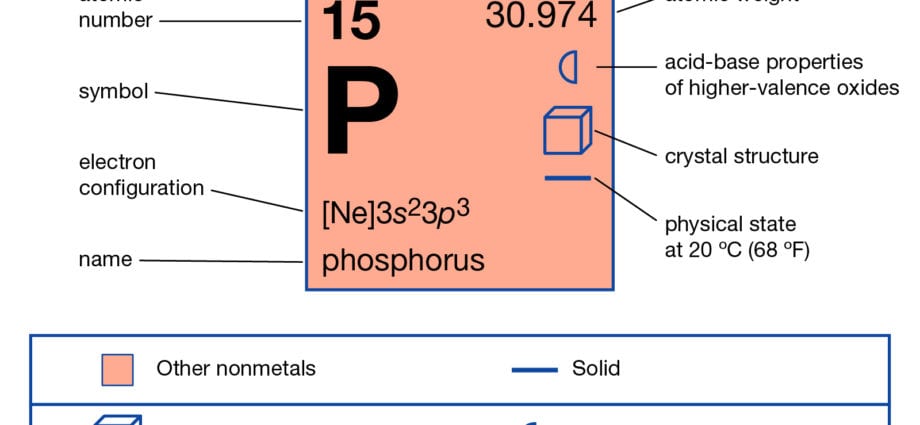Contents
It is an acidic macronutrient. The body contains 500-800 g of phosphorus. Up to 85% of it is found in bones and teeth.
Phosphorus rich foods
Indicated approximate availability in 100 g of product
The daily requirement for phosphorus is 1000-1200 mg. The upper permissible level of phosphorus consumption has not been established.
The need for phosphorus increases with:
- intensive sports (increases to 1500-2000 mg);
- with insufficient intake of proteins in the body.
Digestibility
In plant products, phosphorus is presented in the form of phytic compounds, so its assimilation from them is difficult. In this case, the absorption of phosphorus is facilitated by soaking cereals and legumes.
Excess iron (Fe) and magnesium (Mg) can impair phosphorus absorption.
Useful properties of phosphorus and its effect on the body
Phosphorus affects mental and muscular activity, along with calcium, it gives strength to teeth and bones – it participates in the formation of bone tissue.
Phosphorus is used for virtually every chemical reaction in the body and for energy production. In energy metabolism, phosphorus compounds (ATP, ADP, guanine phosphates, creatine phosphates) play an important role. Phosphorus is involved in protein synthesis, is part of DNA and RNA, and also participates in the metabolism of proteins, carbohydrates and fats.
Interaction with other elements
Phosphorus, together with magnesium (Mg) and calcium (Ca), supports bone structure.
If there is a lot of phosphorus in the diet, then calcium (Ca) forms with it salts insoluble even in water. A favorable ratio of calcium and phosphorus is 1: 1,5 1 – then readily soluble and well-absorbed calcium phosphate salts are formed.
Signs of phosphorus deficiency
- loss of appetite;
- weakness, fatigue;
- violation of sensitivity in the limbs;
- bone pain;
- numbness and tingling sensation;
- malaise;
- anxiety and a sense of fear.
Why phosphorus deficiency occurs
A decrease in the content of phosphorus in the blood can be observed with hyperphosphaturia (increased excretion of it in the urine), which can be with leukemia, hyperthyroidism, poisoning with heavy metal salts, phenol and benzene derivatives.
Deficiency is extremely rare because phosphorus is found in many foods – it is even more common than calcium.










